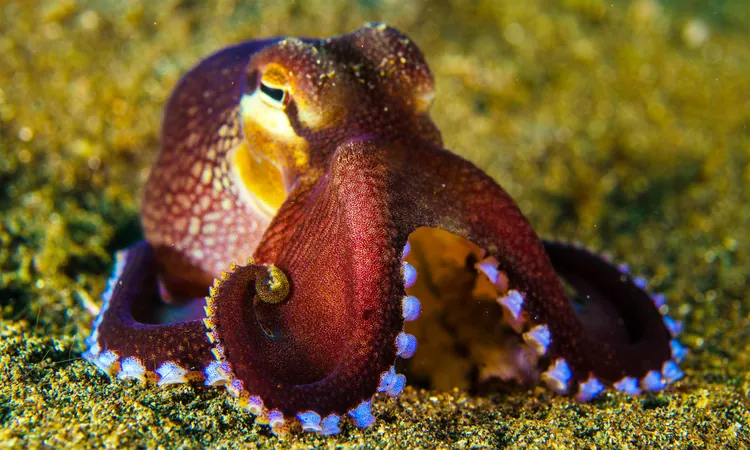
Revolutionary 'DNA Fishing' Unveils Secrets of Deep Ocean Life
2025-04-16
Author: Mei
Exploring the Uncharted Depths
The deep sea, Earth's largest yet least explored realm, houses countless creatures living in overwhelming darkness and silence. Among these enigmatic beings, cephalopods—squids and octopuses—are not just marvels of nature; they play crucial roles in marine ecosystems.
A Challenge in the Abyss
Studying these elusive cephalopods has always been a formidable challenge. Traditional research methods falter in the deep sea, where cephalopods can disappear without a trace. But groundbreaking research from marine ecologist Wu Qianqian and her team from Kobe University is poised to change that.
Enter DNA Fishing!
Wu's team has pioneered a revolutionary technique, utilizing environmental DNA (eDNA)—the genetic material left behind in seawater by marine organisms. This cutting-edge method enables scientists to detect cephalopods by analyzing even the faintest traces of their DNA.
The Importance of Cephalopods
Cephalopods are more than just fascinating creatures; they are vital links in the marine food web. “They contribute significantly to energy distribution in ecosystems,” Wu explained. As both predators and prey, these creatures connect diverse ecosystems, swimming from shallow coastlines to the ocean's profound depths.
Breaking Down the Science
Using specially designed universal primers targeting critical mitochondrial genes, Wu's research team has made it possible to conduct eDNA metabarcoding. This method allows scientists to identify multiple species' DNA from a single water sample, vastly improving the scope of marine research.
A New Era of Marine Discovery
With these innovative primers, researchers successfully identified an array of cephalopod species previously unknown in Japanese waters, unveiling hidden biodiversity and correcting gaps in our understanding of marine life.
Behavioral Insights from DNA
Interestingly, the study revealed that octopus DNA was predominantly found in deeper water samples. This suggests that these solitary creatures prefer bottom-dwelling habitats, lending clues to their behavioral patterns.
Future Implications for Marine Research
The potential of this DNA technique goes beyond mere identification. It can also offer insights into how cephalopods interact with and navigate their environments. However, challenges remain, particularly concerning the accuracy of reference DNA databases. Wu emphasizes the need for collaboration among molecular biologists and taxonomists to tackle misidentification issues.
A Vital Step for Conservation
As human impacts on the ocean continue to escalate, the need for effective monitoring of marine life becomes critical. By harnessing the power of DNA fishing, Wu and her team provide a non-invasive way to track cephalopods—laying the groundwork for future studies on marine biodiversity, population dynamics, and ecosystem health.
In our quest to understand the hidden rhythms of life beneath the waves, these revolutionary DNA tools may be the key to uncovering an entire world we've only scratched the surface of.
Collaboration for Success
This groundbreaking project was a collaborative effort involving esteemed institutions such as Kobe University, JAMSTEC, and several others, showcasing the power of teamwork in marine research.
Read More to Dive Deeper!
Stay tuned for more exciting discoveries in the realm of marine biology and conservation!



 Brasil (PT)
Brasil (PT)
 Canada (EN)
Canada (EN)
 Chile (ES)
Chile (ES)
 Česko (CS)
Česko (CS)
 대한민국 (KO)
대한민국 (KO)
 España (ES)
España (ES)
 France (FR)
France (FR)
 Hong Kong (EN)
Hong Kong (EN)
 Italia (IT)
Italia (IT)
 日本 (JA)
日本 (JA)
 Magyarország (HU)
Magyarország (HU)
 Norge (NO)
Norge (NO)
 Polska (PL)
Polska (PL)
 Schweiz (DE)
Schweiz (DE)
 Singapore (EN)
Singapore (EN)
 Sverige (SV)
Sverige (SV)
 Suomi (FI)
Suomi (FI)
 Türkiye (TR)
Türkiye (TR)
 الإمارات العربية المتحدة (AR)
الإمارات العربية المتحدة (AR)